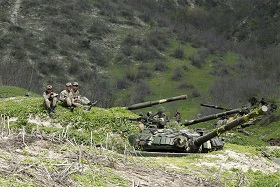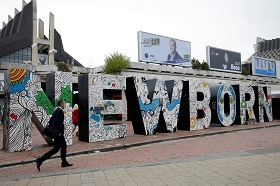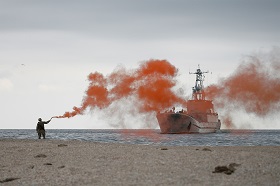The Trans-Caucasus as a region accounts for two-thirds of the armed conflicts that have followed the collapse of the USSR. It was a region of self-proclaimed republics; some of them became stable enough over time so that, even though they have not achieved broad international recognition, they could be categorised not just as separatist entities but as de facto states with their own governance bodies, ideological and political symbols.
Currently, the Caucasus is seldom the focus of topical political discussions. As a rule, it is mentioned within a broader context, such as Black Sea region security or the state of affairs in the Greater Middle East.
In the long and medium-term, the Trans-Caucasus will remain a divided region. The “three countries — three different strategies” principle will remain. Armenia will attempt to remain an ally of Russia, while Georgia will try to stay an ally of the “collective West in general” without forgetting to diversify its foreign political ties. Both Erevan and Tbilisi will have internal and external restrictions. Moscow will hardly welcome Erevan expanding its cooperation with NATO and the EU, while Washington will hardly welcome Georgia improving its relations with Russia and China. Azerbaijan will have no alternative to the “non-alignment” policy both within the so-named movement Baku joined back in 2011 and owing to its national interests. All these factors make pan-Caucasus projects, unions or alliances virtually impossible.
As regards external actors, the Caucasus will not lose its significance even if it is overshadowed by other political conundrums, such as the south-east of Ukraine, the “Kurdish issue”, Iran or Syria. It is hard to expect a common approach to the region. The US and Russia will continue to interact selectively on the Karabakh settlement, but will still be locked in a bitter confrontation over the status of Abkhazia and South Ossetia. Iran and Turkey will play their own parts without joining either the Russian or the Western sides, although Ankara will formally remain a NATO member. China will step up its economic presence, although, in the near future, the Caucasus will not become Beijing’s political priority comparable to Central Asia.
In late 2016, the Russian International Affairs Council published The Evolution of the Post-Soviet Space: Past, Present and Future, a major anthology attempting to conceptualise development trends in both domestic and foreign policies in the newly independent states that emerged after the collapse of the once-single state, the USSR. The Trans-Caucasus featured prominently in that collection, and for good reason.
The Trans-Caucasus as a region accounts for two-thirds of the armed conflicts that have followed the collapse of the USSR. It was a region of self-proclaimed republics; some of them became stable enough over time so that, even though they have not achieved broad international recognition, they could be categorised not just as separatist entities but as de facto states with their own governance bodies, ideological and political symbols.
When the independence of Abkhazia and South Ossetia was recognised in August 2008, it was the Caucasus that saw the precedent of changed borders between the former Soviet republics.
It was in the Caucasus that Georgia, in its bid for NATO membership, held a referendum on acceding to the alliance and over two-thirds of Georgians voted for accession. Consequently, strategic cooperation with NATO was, in addition to rhetoric, bolstered by a popular vote.
The Trans-Caucasus is the only region in the post-Soviet space where presidential power has been transferred from father to son. Azerbaijan was the trailblazer in this mode of power transfer. For nearly two decades, Georgia has not been able to resolve the problem of a legitimate and legal transfer of supreme state power. Armenia’s gift to the post-Soviet space was also a curious precedent: for the first time since the collapse of the USSR, a former president, upon leaving office, attempted a return to politics as a die-hard opposition member. In 2008, Levon Ter-Petrosyan even came close to returning to the state’s Olympus after ten years of being an ex-head of state.
The Caucasus: An Independently Important Region
Currently, the Caucasus is seldom the focus of topical political discussions. As a rule, it is mentioned within a broader context, such as Black Sea region security or the state of affairs in the Greater Middle East.
In the first instance, settling the armed conflict in the south-east of Ukraine and minimising the costs of the West–Russia confrontation are priorities. In this context, the Caucasus is seen, particularly by European and American experts, as a potential recipient of the “Crimean case.” Initiatives intended to bolster integration ties between Moscow, Sukhum and Tskhinval periodically heat up this discussion. Such was the case when South Ossetian politicians debated a referendum on uniting with North Ossetia under the auspices of the Russian Federation. In his Letter of Instruction of 22 September 2016, Russian President Putin gave instructions to sign an agreement on financing modernisation of Abkhazia’s military, which spurred more heated discussions.
Regarding the Middle East, the focus is on the Iran–US escalation, since the Islamic Republic of Iran borders on Armenia and Azerbaijan and considers the Trans-Caucasus as a tool for building cooperation with the Eurasian Economic Union. Syria is another equally important area. Armenia views Turkey’s involvement in Syrian affairs as a dangerous precedent while specifically emphasising that Azerbaijan supports Turkey’s operations, such as the Source of Peace.
Russia’s military participation in the Syrian conflict is of equal importance: for the first time since the collapse of the USSR, Russia has used its military power outside the territory of the single state. One should keep in mind that going beyond the post-Soviet political geography was primarily determined by the situation in the Caucasus: among radical Jihadis fighting in the Middle East were quite a few natives of the Russian North Caucasus republics, of Azerbaijan and Georgia.
Whatever international security problems are put at the forefront today, thereby overshadowing the Caucasus challenges, this region retains its independent significance. The armed conflicts that accompanied the collapse of the Soviet Union have been significantly transformed and have partly lost their relevance (especially compared to the Donbass conflict). Yet, they remain unresolved, and the problem of de facto states is still relevant. Unlike Nagorno-Karabakh, Abkhazia and South Ossetia have achieved partial international recognition, but it is still disputed by Georgia and its western allies.
Moreover, disagreement with the new status quo that emerged after Russia recognised Abkhazia and South Ossetia is not confined to the rhetoric of public officials. What is far more critical is that Georgia is building up its military and political cooperation with NATO, the US and the EU, and even without Georgia’s official accession to NATO, this cooperation creates additional security risks in the region.
The conflict between Armenia and Azerbaijan over Karabakh has, for many years, been swinging like a pendulum. Armed incidents alternate with rounds of talks between just Erevan and Baku, or talks with the participation of international intermediaries. The result is the same: the focus is on managing the conflict by minimising the costs of the “neither peace nor war” state of affairs, rather than on settling it.
A deficit of regional integration still characterises the Caucasus. The three Trans-Caucasus states steer different foreign political courses. The absence of diplomatic relations and the unsettled Armenia–Azerbaijan conflict make Tbilisi an insufficient partner for both Erevan and Baku. Georgia does not want to make a “final choice” between its neighbours. At the same time, Tbilisi has no diplomatic relations with Russia and, since Armenia became independent, it has not established diplomatic relations with Turkey. Currently, the prospects for normalising Erevan–Ankara relations seem remote, and it is not only a matter of unresolved problems from the past, but also of the diametrically opposing views of a Karabakh settlement.
At the same time, the Caucasus agenda is changing. It has never been possible to paint it in just two colours, merely as a Big Game between the West and Russia, both using the Trans-Caucasus countries. Today, however, we are seeing new actors being pulled into regional processes; previously, these actors had either insignificant or no influence in the region. China is the starkest example. As Asian Studies specialist Stanislav Tarasov aptly said, China has launched “diplomatic probing” in the Caucasus. In May 2019, Wang Yi, China’s Minister of Foreign Affairs and State Councillor, visited all three Trans-Caucasus states, his visit being called “historic.” Beijing offers the region respect for its territorial integrity, non-interference in its domestic affairs and pragmatic economic cooperation. Naturally, China incurs no losses, its primary objective being to implement its strategic “One Belt — One Road” project.
Past and Current Forecasts
Azerbaijan: Effective Ties and Pragmatics
In his article “Azerbaijan in 2021: Reasserting Sovereignty”, Murad Gassanly stated that the Karabakh issue was the key one on Baku’s political agenda. And this issue remains such today. Azerbaijan’s principal decisions, such as participating in integration projects and handling its bilateral relations with the US, Russia, Iran, Turkey and Israel are dictated precisely by the prospects of resolving this issue in favour of Azerbaijan. Baku has little interest in the fact that Tehran and Tel-Aviv, Moscow and Washington are locked in harsh confrontations.
Azerbaijan’s approaches to all areas are primarily pragmatic. Consequently, Gassanly (and many other experts) justly notes that Baku distances itself from alliances, complex mutual commitments, from seeking effective bilateral ties. “There will be no place for abstract ideological notions and sentimental concerns”, Gassanly states. I believe this course will remain relevant for the near future.
Azerbaijan will strive to avoid getting involved in a large-scale military conflict. The “four-day war” of 2016 showed clearly that the chances of a blitzkrieg under current circumstances are slim. Yet Azerbaijan will continue to build up its economic potential, strive to attract various investments (from both the West and China), and to diversify its economy. This started in 2018–2019 with a large-scale personnel replacement. Such political heavyweights as Ramiz Mekhtiev, Artur Rasaidze, Novruz Mamedov, Gadjibula Abutalybov, and Ali Gasanov have already left their offices. Comrades-in-arms of Geidar Aliev and mentors of his son Ilham are being replaced by those who owe their career and achievements in politics and business to the current President.
The new staffers should, on the one hand, give a new impetus to the “non-alignment” policy while, on the other hand, ensuring new blood in the authorities without “maidans” and major social upheavals. In the medium-term and particularly the long-term, the threat to Azerbaijan from the non-systemic opposition, including radical Islamists, remains. Azerbaijani authorities have experience of countering this threat and they have developed certain skills for containing it. Even so, it is much easier to influence weak and disjointed secular opposition than extremists.
Armenia: Course toward Moscow Continues
In his article “Armenia after Twenty-Five Years of Independence: Maintaining Stability in an Unpredictable Neighbourhood”, Hovhannes Nikoghosyan lists the following principal domestic policy trends in Armenia: the succession of generations and evolution of a parliamentary republic. The “velvet revolution” symbolically emphasised both tendencies. The generation now in power had no political careers in the USSR. It is also symbolic that, for Nikol Pashinyan, Armenia’s new Prime Minister, Russian is the second language he learned, not a second native language.
At the same time, Serzh Sargsyan had been building a parliamentary republic to prolong his own political tenure, not finally to separate the branches of power, and such a republic has already encountered functional difficulties. So far, the ratings and standing of Nikol Pashinyan, recent idol of the street protests, are high, and no significant problems await the authorities. Yet the moment the situation changes, the prospects of endless elections, talks about coalitions and the reshuffling of political combinations will materialise. Whether this development will boost the stability of a country involved in an unresolved ethnic political conflict is a purely a rhetorical question. This is the context for understanding the Prime Minister’s statement that he does not rule out the possibility of Armenia returning to a presidential state. Most likely, such attempts will be undertaken in the future. Pashinyan intends to stay in power for a long time and, during his first year on the republic’s Olympus, he has already faced social discontent and political opposition. In the near outlook, he will most likely face the task of staying in power by using administrative and bureaucratic methods, rather than a tide of revolution.
Nikoghosyan rightly noted the development of allied relations with Moscow as determining Armenia’s foreign policy. Even though Russia reacts very painfully to the revolutionary transfer of power in post-Soviet states, the Kremlin perceived Pashinyan in a positive light. The reason is that he steered Armenia’s traditional post-Soviet course of a state conducting a diversified foreign policy while clearly emphasising the usefulness of its ties with Russia.
This approach allowed a conflict between Moscow and Erevan to be avoided even after such sensational events as “the Kocharyan case” and “the second stage of the revolution” intended to break Armenia’s old judicial system. In some areas (such as participation in the pacification of Syria), Nikol Pashinyan’s Armenia went even further in consolidating ties with Russia than Armenia under Serzh Sargsyan’s presidency. Most likely, Moscow will be able to forgive Armenia’s Prime Minister any eccentric steps and populist revolutionary rhetoric as long as it does not break down the Russo-centrism of Armenia’s foreign policy.
Georgia: The Bonds of Post-Sovietness
In his article “Georgia: A Time of Anticipation”, Nikolay Silaev focused his attention on the country's flight from both Soviet and post-Soviet affiliation. In the meantime, both such kinds of affiliation are holding Georgia back, in the form of conflicts in Abkhazia and South Ossetia and unresolved territorial disputes (both with Russia and Azerbaijan).
Tbilisi is attempting to break these bonds by stepping up its contacts with the West (NATO, the EU, the US). In and of itself, this cooperation pursued by all de facto and de jure Georgian leaders from Zviad Gamsakhurdia to Bidzina Ivanishvili has not helped Georgia resolve any of its problems, be it efficient economic development, democracy (why is a kind of “democratic beacon” governed by a successful oligarch?), security or territorial integrity.
“NATO is hesitant in its relations with Georgia. Brussels, Washington and major Western European capitals likely view it as too dangerous for NATO to give Georgia security guarantees when Russian troops are located in Abkhazia and South Ossetia”, Silaev states.
Taking this assessment made in 2016 even further, one might say that these hesitations have only grown and will continue to do so in the near future. In this context, it is quite logical that Luke Coffey from The Heritage Foundation or Anders Fogh Rasmussen, NATO's former Secretary-General, publicly discuss “the price tag” attached to the issue, such as Article 5 on the collective defence in the Washington Treaty not extending to Abkhazia and South Ossetia. This is certainly not official discourse yet; it is only an invitation to a discussion. Even so, these invitations will multiply over the years, and they will be made against the background of two crucial domestic political developments in Georgia itself.
The first one is disputing the dominance of the “Georgian Dream” and the leadership regime built by Bidzina Ivanishvili to serve his own interests. Mass protests in June and November 2019 are unlikely to bring down the current authorities. Yet they will create a powerful charge of discontent and a bizarre coalition of Atlanticists, Eurosceptics and pragmatists founded on the negative agenda of forcing Ivanishvili’s withdrawal from politics. This process might take a while, but it has already been launched.
The second development is the bolstering of a foreign political alternative against the background of disappointment in NATO and the West in general. The key problem here is politicians’ personal ambitions and ideological fogginess. What is proposed in place of a strategic alliance with the West? Movement toward a compromise with Russia concerning Abkhazia and South Ossetia is restricted; without significant changes to the international and regional agenda, Moscow will not change its mind regarding the status of the two former autonomous republics of the Georgian Soviet Socialist Republic.
As a consequence, the demand may strengthen for diversification, for equal relations with Iran, China and Moscow’s Eurasian partners (Belarus and Central Asia states). There will also be the question of making relations with Russia more pragmatic, although there will be no quick solutions here even if Georgia proclaims its non-aligned status. The differences between Moscow and Tbilisi run too deep today.
Forecast: The Region Will Remain Divided
In the long and medium-term, the Trans-Caucasus will remain a divided region. The “three countries — three different strategies” principle will remain. Armenia will attempt to remain an ally of Russia, while Georgia will try to stay an ally of the “collective West in general” without forgetting to diversify its foreign political ties. Both Erevan and Tbilisi will have internal and external restrictions. Moscow will hardly welcome Erevan expanding its cooperation with NATO and the EU, while Washington will hardly welcome Georgia improving its relations with Russia and China. Azerbaijan will have no alternative to the “non-alignment” policy both within the so-named movement Baku joined back in 2011 and owing to its national interests. All these factors make pan-Caucasus projects, unions or alliances virtually impossible.
As regards external actors, the Caucasus will not lose its significance even if it is overshadowed by other political conundrums, such as the south-east of Ukraine, the “Kurdish issue”, Iran or Syria. It is hard to expect a common approach to the region. The US and Russia will continue to interact selectively on the Karabakh settlement, but will still be locked in a bitter confrontation over the status of Abkhazia and South Ossetia. Iran and Turkey will play their own parts without joining either the Russian or the Western sides, although Ankara will formally remain a NATO member. China will step up its economic presence, although, in the near future, the Caucasus will not become Beijing’s political priority comparable to Central Asia.








